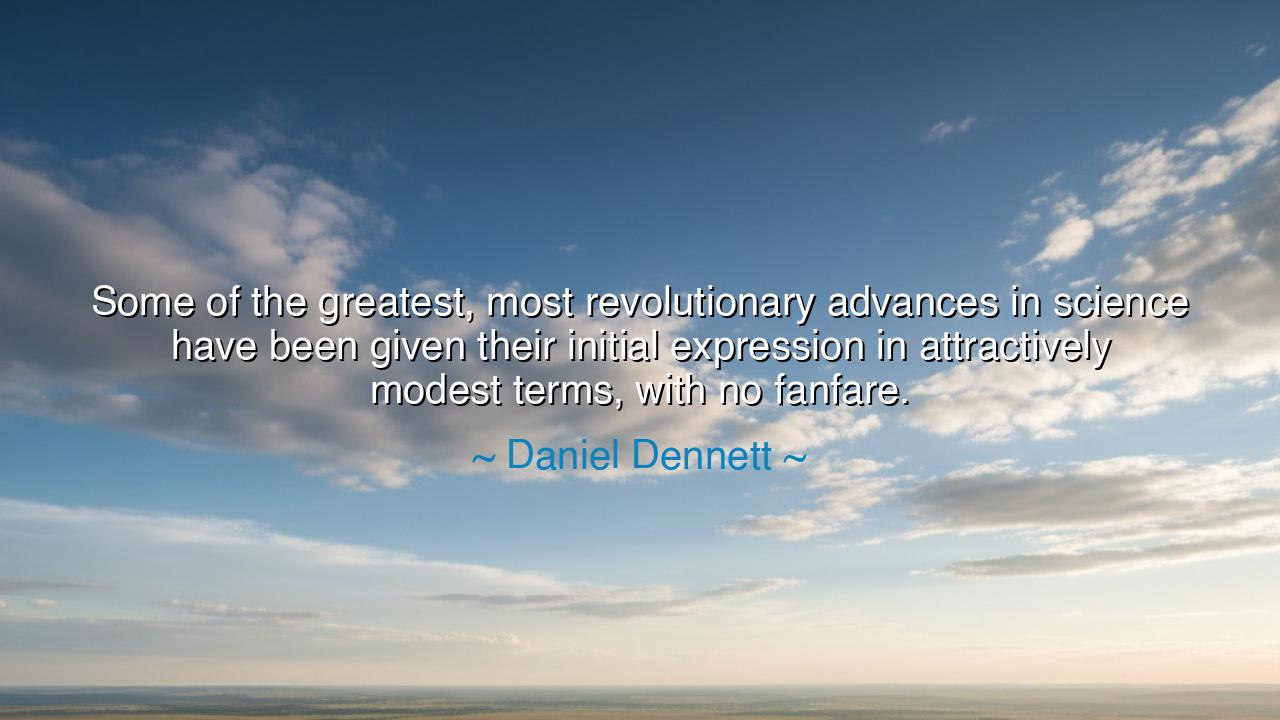
Some of the greatest, most revolutionary advances in science have
Some of the greatest, most revolutionary advances in science have been given their initial expression in attractively modest terms, with no fanfare.






Listen, O children of the future, for the words of Daniel Dennett carry a timeless truth, one that speaks to the quiet, often unnoticed, nature of great discoveries. "Some of the greatest, most revolutionary advances in science have been given their initial expression in attractively modest terms, with no fanfare." In these words, Dennett illuminates the often humble beginnings of the most profound ideas. The greatest advances in science do not always arrive with the trumpets of fanfare; they do not demand attention with grandiose declarations or loud celebrations. Instead, they often begin in quiet corners, expressed in modest terms, with the subtlety of a whisper that, over time, becomes a roar that reshapes the very fabric of our understanding.
In the ancient world, O children, the pursuit of knowledge was often slow and gradual, with breakthroughs arriving not in flashes of glory, but in the patient labor of those who sought truth without need for recognition. Think of Archimedes, the great mathematician and engineer, whose discovery of the principle of buoyancy came not with fanfare, but in a moment of quiet reflection as he stepped into his bath. It is said that Archimedes leaped from his bath, shouting, "Eureka!" in his discovery, but in his initial expressions of the idea, it was not grandiose, nor did he demand the world to take notice. His discovery was quiet, yet it changed the world of physics and mathematics forever. Archimedes' principle did not arrive with a great spectacle—it was a quiet truth that became louder and louder with time.
Similarly, Isaac Newton, the father of classical mechanics, did not step into the world’s spotlight with flamboyant announcements. Instead, his laws of motion and universal gravitation were revealed with a quiet confidence, expressed in the pages of his Principia Mathematica. In that work, he made no grand speeches about the revolutionary nature of his findings. Instead, he wrote carefully, with simplicity and clarity, explaining the universe through mathematical precision. Newton understood that the power of science lies not in the noise of announcement, but in the clarity and universality of the idea itself. His ideas took root over time, growing from modest expressions into the bedrock of modern physics.
Dennett’s words also remind us of the work of Charles Darwin, whose theory of evolution by natural selection has become one of the most profound and revolutionary ideas in the history of biology. When Darwin first presented his theory in "On the Origin of Species," it was not met with the celebratory acclaim that might be expected of such a monumental idea. In fact, Darwin presented his theory in a manner that was almost conservative in its tone, carefully tempering the implications of his work. There were no grand public speeches, no fanfare accompanying the theory of evolution; it was a careful, methodical argument that slowly gained ground, reshaping the world’s understanding of life on Earth. Darwin’s theory began humbly, but it has since grown into one of the cornerstones of modern science.
In modern science, O children, the same pattern holds true. Consider the discovery of DNA, the very blueprint of life. James Watson and Francis Crick did not announce their discovery with great fanfare, but with the quiet conviction of knowing they had uncovered a foundational truth about life itself. The double-helix structure of DNA was revealed in simple, straightforward terms, yet it was a discovery that would revolutionize biology, medicine, and even the very understanding of what it means to be human. The discovery of the structure of DNA was not shouted from the rooftops—it was carefully explained, step by step, through research and evidence, and it grew into the grand idea it is today.
The lesson, O children, is one of humility and patience. The greatest ideas in science often emerge quietly, without the need for loud proclamations. Dennett’s words teach us that revolutionary change does not require fanfares or attention-seeking gestures. The power of science lies in its simplicity, its elegance, and its quiet strength. The most profound truths about the world are not always flashy or dramatic; they are often expressed in modest terms, building slowly over time until they reshape everything we know.
So, O children, as you walk the path of discovery, remember that the pursuit of knowledge is not a journey for fame or recognition. It is a pursuit of truth, no matter how small or humble that truth may seem at first. Be like Archimedes, Newton, and Darwin, whose work began quietly but changed the world. In your own journey, do not seek to be noticed, but seek the truth. Let your discoveries be grounded in evidence, in reason, and in clarity, for it is these quiet truths that will one day rise to shape the world. Greatness in science is not measured by the noise you make, but by the truth you uncover, the clarity you bring to the unknown, and the lasting impact of your work on the world.
Thus, O children, let patience and humility guide you. Seek not the recognition of the world, but the quiet satisfaction of uncovering the truth. For in the end, it is not the grand announcements that change the world, but the quiet, careful steps of those who seek, question, and discover—modestly, steadily, and with an unwavering commitment to the truth.






AAdministratorAdministrator
Welcome, honored guests. Please leave a comment, we will respond soon